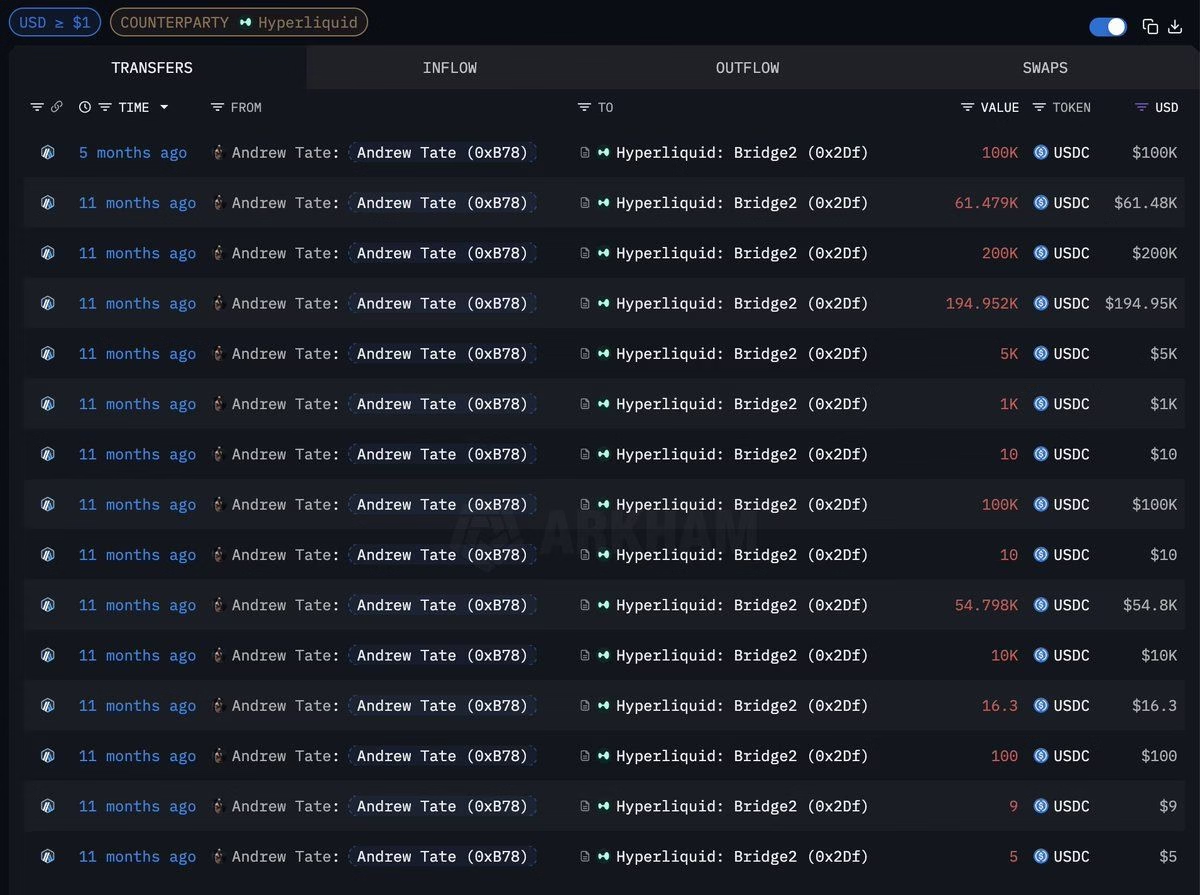In a development drawing sharp attention from crypto investors, Andrew Tate has suffered yet another Hyperliquid liquidation, losing more than $800,000 in a series of high-leverage trades on the decentralized perpetual exchange Hyperliquid.
The incident — one in a long pattern of wipeouts — has fueled debate over whether the platform’s leverage environment is contributing to systemic losses among inexperienced and high-profile traders.
Arkham Intelligence data confirms that Tate deposited $727,000 into the exchange and kept all funds locked in open positions until a final, total Hyperliquid liquidation wiped out nearly everything.
The cycle continued when he attempted to trade an additional $75,000 earned from referral income, only for those funds to disappear through the same series of cascading losses.

“Andrew Tate is now fully liquidated on Hyperliquid. He has only $984 left,” analyst Param explained, detailing the latest Hyperliquid liquidation sequence. “Some people thought he had been liquidated many times before. But he earned the money through referrals and traded that money on HL again and again.”
A trading history marked by volatility and repeated wipeouts
Tate’s track record on the exchange has long reflected unstable performance, culminating in multiple rounds of Hyperliquid liquidation. In June 2025, he suffered a major loss of $597,000. His attempts to recover in the following months only deepened the trend.
Analyst StarPlatinum noted that his September long on the World Liberty Financial (WLFI) token ended in a $67,500 loss — followed almost immediately by another failed position. On November 14, Tate was hit again, this time on a 40× leverage BTC long that ended in a $235,000 Hyperliquid liquidation event.
One of Tate’s few positive outcomes came in August, when he secured a $16,000 gain on a short position. Even that success was short-lived, erased by new trades that quickly turned negative.
With over 80 trades recorded and a win rate of just 35.5%, Tate’s cumulative confirmed loss now stands at $699,000 — a stark demonstration of the hazards associated with aggressive leverage.
“Based on this trading record, Andrew Tate might be one of the worst traders in crypto. And people still pay him for advice,” a market watcher wrote after reviewing his latest Hyperliquid liquidation.
Other traders face similar high-stakes collapses
Tate is far from the only trader to experience severe losses driven by extreme leverage. Several well-known crypto whales — often considered influential players in the leverage markets — have faced their own dramatic Hyperliquid liquidation events on the platform.
James Wynn lost more than $23 million, watching his multimillion-dollar account shrink to just $6,010. In July, trader Qwatio absorbed a $25.8 million liquidation after a rally moved sharply against his short positions.
Another whale, identified as 0xa523, recorded losses of $43.4 million in a single month — one of the most severe Hyperliquid liquidation cases on record.
These incidents underscore a broader pattern: leverage amplifies market movements with extraordinary force, and decentralized perpetual exchanges give traders more flexibility — but also fewer safeguards — than traditional platforms.
A broader warning for crypto speculators
The wave of Hyperliquid liquidation losses from Tate, Wynn, Qwatio, and other traders serves as a critical cautionary tale across the trading community. While some users have achieved large profits through the platform’s leverage options, the rapid speed of liquidation, combined with volatile price swings, highlights the thin margin between success and wipeout.
The influence of high-profile figures like Tate may draw new traders toward leveraged products, yet his repeated Hyperliquid liquidation events illustrate how quickly the strategy can destabilize an account.
For crypto investors, his experience strengthens ongoing debates about risk management, trading education, and the psychological pressure associated with high-velocity markets.
As decentralized exchanges continue growing in adoption, these cases remain a powerful reminder: leverage can amplify opportunity — but it also magnifies every error. And even the most visible traders are not exempt from its consequences.

Leave a Reply